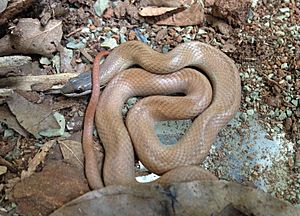Ialtris facts for kids
Quick facts for kids Ialtris |
|
|---|---|
 |
|
| Ialtris agyrtes | |
| Scientific classification |
|
| Kingdom: | Animalia |
| Phylum: | Chordata |
| Class: | Reptilia |
| Order: | Squamata |
| Suborder: | Serpentes |
| Family: | Colubridae |
| Subfamily: | Dipsadinae |
| Genus: | Ialtris Cope, 1862 |
| Synonyms | |
|
Darlingtonia Cochran, 1935 |
|
Ialtris is a group, or genus, of snakes. These snakes belong to a larger family called Colubridae, which includes many common snakes around the world. Ialtris snakes are special because they are found only on the island of Hispaniola. This means they are endemic to that island.
Where Ialtris Snakes Live
Ialtris snakes are found in two countries on the island of Hispaniola. These countries are the Dominican Republic and Haiti. They live in different parts of the island, from lowlands to higher areas.
Types of Ialtris Snakes
There are four main types, or species, of Ialtris snakes. Each species has its own unique features. One of these species, called Ialtris haetianus, also has three different kinds of subspecies. Subspecies are like different versions of the same animal that live in slightly different places.
Here are the recognized species and subspecies:
- Ialtris agyrtes - This snake is sometimes called the Barahona red-headed racer or Barreras fanged snake. It was first described by scientists Schwartz and Rossman in 1976.
- Ialtris dorsalis - Known as the Hispaniolan W-headed racer or brown fanged snake. It was first described by Günther in 1858.
- Ialtris haetianus - This species is also called the Hispaniolan upland racer or Haitian ground snake. It was first described by Cochran in 1935.
- Ialtris haetianus haetianus - This is the main type of I. haetianus.
- Ialtris haetianus perfector - This subspecies was described by Schwartz and Thomas in 1965.
- Ialtris haetianus vaticinata - This subspecies was described by Schwartz in 1970.
- Ialtris parishi - You might hear this one called the Tiburon banded racer or Parish's fanged snake. Cochran described it in 1932.
See also
 In Spanish: Ialtris para niños
In Spanish: Ialtris para niños
 | Leon Lynch |
 | Milton P. Webster |
 | Ferdinand Smith |

